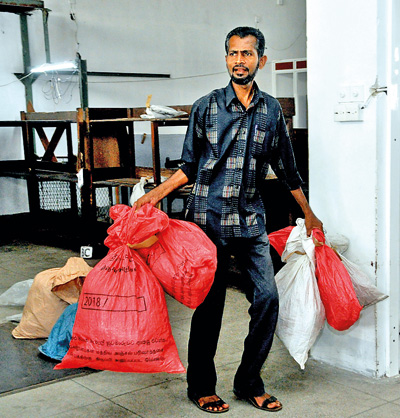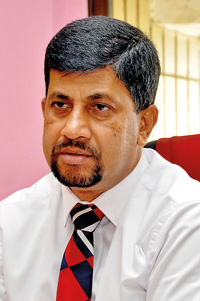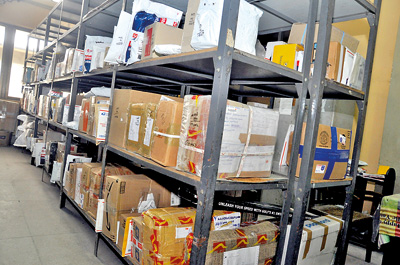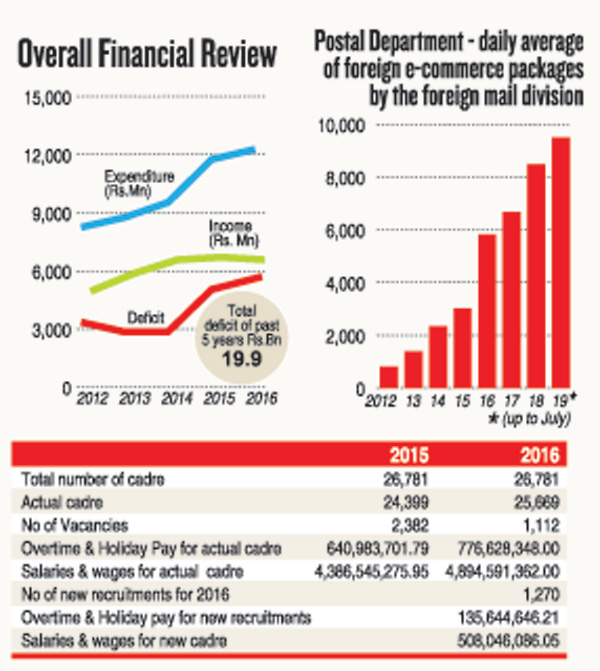News
Please Mr Postman, explain this Rs.5 billion deficit
The Postal Department continues to run at a loss, incurring a deficit of more than Rs. 5 billion last year.

Colombo Mail Exchange: Most domestic mail is still manually sorted and packed for distribution. Pix by Priyantha Wickramaarachchi
The department had an accumulated deficit of almost Rs. 20 billion from 2012 to 2016, according to a senior department official who wished to remain unnamed.
The Rs. 5 billion deficit comes amid a rise in customer complaints that delivery of mail is slow and sometimes never reaches the intended recipients.
“Only the pension documents come on time with any regularity. Even that doesn’t reach us when the postal workers are on strike, and some months we get newsletters and cards coming several weeks late,” 83-year-old pensioner Lal Ariyadasa, complained, one of many who are discontented with the standards of postal service.
“I am not tech-savvy and rely on newsletters and personal mail to keep in touch with my old work colleagues and friends” said Mr. Ariyadasa, a resident of Kalapaluwawa.
He pointed out that for many people of his generation regular printed publications was the most affordable and practical means of being in touch with events.
The last few decades has seen a significant drop of domestic private mail as Sri Lankans followed the global trend of migrating to technological means of communication using mobile phones, electronic mail, fax and messaging platforms.
“Some of the magazines and publications I subscribe to go missing and the postman says they weren’t in the mail,” complained Rohini Liyanarachchi a resident of Rajagiriya.
“I live in the capital – if I don’t get my monthly magazines delivered I can only imagine how those who live in rural areas are treated,” she said.
Mrs. Liyanarachchi pointed out that she, like many, picked the most economical postal delivery structure categorised as normal airmail for her overseas subscriptions.

Bundles of mail
“However, out of the 12 editions a year I always miss out on one or two. What happens to them? The postal department needs to give answers without sending us from pillar to post seeking answers,” she said.
Even though it operates in deficit, is over-staffed and accused of delays and losses the postal department shows no tangible signs of resizing its workforce to meet modern needs.
“The entire department needs to be overhauled and resized according to a new business model,” the senior official speaking on condition of anonymity claimed.
There are close to 24,000 employees and the authorities are seeking to employ even more. “One of the core problems are that we are overstaffed. No work study has been done to assess where the organisation is heading,” he said.
He says it is common for some employees to go home without finishing their shifts.
Strong opposition from trade unions has seen the department shelve plans to install the biometric (fingerprint) sign-in and sign-out systems that are widely used in the government and private sector.
“In some sections there are two or three staff members to do the same task. Supervisors mark their attendance and what they get up to is anyone’s guess,” the official claimed.
The department is doing the best it can, the Superintendent of the Central Mail Exchange (CME), Sisira Kumara, claims. “We provide the best with what is available to us and we can do more if there is investment in modernisation,” he said.

Lalith Liyanage
Mr. Kumara claims that in spite of a drop in the traditional private mail volume, the mail exchange has to work around the clock to ensure that domestic mail, foreign mail and parcels are delivered on time.
On visiting the mail exchange last week, The Sunday Times found that most domestic mail is still manually sorted and packed for distribution.
“We are working on the computerisation of some divisions and we need more technology-skilled staff,” Mr. Kumara argued. He conceded that some mail gets delayed but pointed out that there is now a departmental courier service offering same-day service within Colombo city limits and next day service for the suburbs.
Many private companies, including some banks, are, however, opting to use the services of the many domestic private courier services to quickly deliver their business mail and publications.

Sisira Kumara
With many private courier services competing for market share, Sri Lanka Post will need to stay abreast of changes in technology such as e-payment facilities and to offer options such as “pick up and drop off” to be competitive.
One division that has seen a rise in the volume of mail processed is the foreign parcel post, with steady growth in the number of parcels growing each year. This year, the division received and sorted some 9,500 parcels daily (mainly goods ordered via online vendor websites) up about 1,000 a day from 2018.

Stacked up: Sorted out parcels
The head of the foreign parcels division, Lalith Liyanage, insisted that any complaints of missing mail or parcels are taken seriously and urged all customers to accurately send their mailing addresses to the sender and to keep records of the order and tracking number of parcels as such details would make it easier to locate missing parcels.
“We follow up on each complaint and in many occasions we find the mail mis-labelled or with an incorrect address. It is a common mistake, especially with the spelling of street names and suburbs,” he said.
Unlike international courier services that deliver parcels to your doorstep, the postal department sends a notice to the consignee to pick up the parcel within seven days. “We have a service where we can deliver the parcel to your nearest post office for pick up,” Mr. Liyanage pointed out.
Unions in the postal department resent the 6/2006 public administrative circular that brought in an equal pay scale for all employees regardless of qualifications or experience.
“We have discussed our demands with six different ministers, three postmaster-generals and about 15 ministry secretaries over more than 13 years,” Chinthaka Bandara, Convener of the United Postal Trade Union Alliance, said.
He said the postal service is facing major drawbacks locally and internationally due to the lack of use of technology.
“As a result of this we cannot compete with other local and international companies providing similar yet a better postal service,” Mr. Bandara said.
Most of the department’s users live in rural areas, he said, adding, “We have fewer business entities dealing with us. As a result we cannot expect higher profits.”

A mound of mail awaits sorting
He claims the great losses incurred by the department are due to the fact that the government decides on prices for postal services.
Mr. Bandara suggests the islandwide cost of posting a mail item for Rs.15 should be increased and that free services offered to parliamentarians and government departments should be reconsidered.
He said the department, by allocating approximately Rs.3.5 million for free postal services for each politician, is facing thumping losses given there are 225 parliamentarians.
“If we transform the free services into a form of revenue the department would be able to earn huge profits,” he said.
Mr. Bandara also warned that if no solution is given to the equal pay scale complaint, postal trade unions will stage token strikes along with other unions in the run-up to the presidential election due in December.
“We have already started talking to other trade unions to pressure the government,” he said.
The President of the Sorting Officers’ Union, A.D. Jeewananda, pointed out that many employees in the department do not wish to entertain the idea of introducing machinery as it would endanger their jobs, although he strongly believes that the department will find alternative job opportunities for them.
He says it is impractical to introduce machinery to sort letters as sorting machines only accept envelopes in three standard sizes. Sorting officers come across many letters that do not even come in envelopes because the sendes are seeking to cut costs.
“A couple of months ago, a Malaysian company wanted to buy the postal department and make it a private sector institution because it had identified the advantages and the revenue that the department is capable of bringing,” Mr. Jeewananda said.
He claims many departmental employees want the institution to function as a private company as they expect higher pay from such a change.
“The meagre salary given to us is not enough to match the cost of living of the current times and many in the department are lethargic because they believe they are not paid enough for their efforts,” Mr. Jeewananda said.
| Security scanning beefed up | |
| The Central Mail Exchange has recently installed a state-of-the-art scanning room equipped with three parcel-scanning x -ray machines, CME Superintendent Sisira Kumara said. “The room was set up late last year and we work closely with the customs department and the police to ensure no dangerous items or contraband get into the country through the post,” he said. A police dog squad unit visits the parcels division daily and inspects incoming and outgoing parcels. Mr. Kumara said that with the help of the customs and police recently, several parcels of methamphetamine coming into the country were detected. |
| Money rolls in despite thumping losses | |
| Postal revenue recorded for 2018 was a thumping Rs. 7.7 billion – a 10 per cent increase from 2017, according to the 2018 performance report of Sri Lanka Post. Expenses rose from Rs.12.6 million to almost Rs. 12.9 million in the same period, a trend of rises caused mainly by salary increases, overtime payments and employment of more staff. In 2017, the department received 5.7 million kg of air mail (letters) but this dropped sharply in 2018 to 748,142kg – an 87 per cent reduction. Airmail dispatched by the department in 2018 dropped by 10 per cent to 123,793kg. According to a study conducted by the department, a person receives 17 letters annually. Postal service income per person is Rs. 278,562 while postal service expenditure per person is Rs. 501,467. In 2016, Rs. 135 million was allocated for capital expenditure, but this figure shot up to Rs. 522 million in 2017. For transportation of mail to outstation areas the postal department seeks assistance from both the Railway Department and the Ceylon Transport Board (CTB). In 2017, the railway department was paid Rs. 27 billion and the CTB was paid Rs. 56.7 million. There was a notable reduction in the issuing of postal identity cards for school students, from 11,636 in 2016 to 6,346 the next year. The department’s performance report lists some improvements in 2017: implementation of the departmental e-service through sub post offices, launching software to accept water bill fees through post/sub post offices, launching and maintaining a website, www.bepost.lk for opening the e-Business service and launching software to collect cooperative insurance premiums through post offices. |

